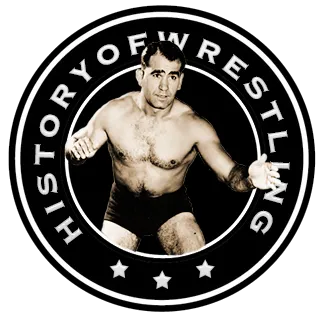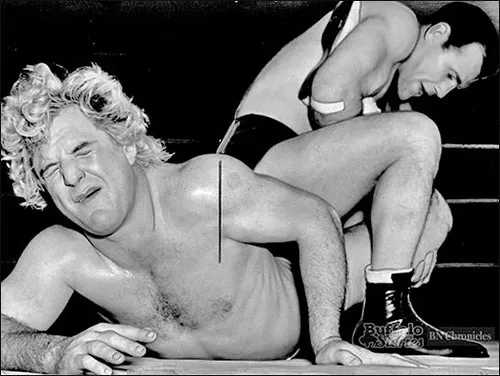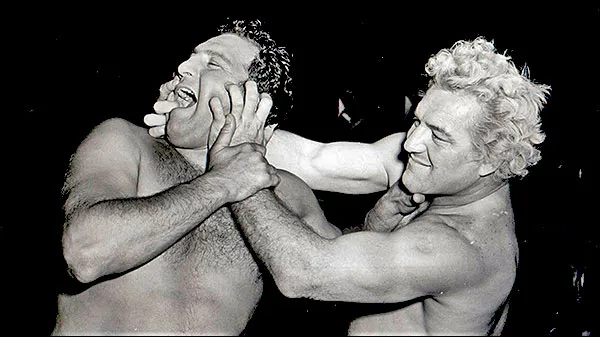by Stephen Von Slagle
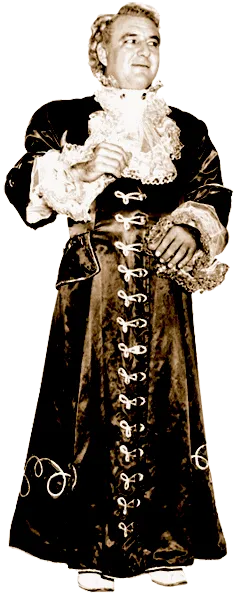 George Wagner, a.k.a. Gorgeous George, was truly the original showman of professional wrestling, perhaps the first-ever “sports entertainer” and his flamboyant theatrics unquestionably forever changed professional wrestling. During his mid-20th century heyday, a more famous or controversial entertainment figure could not be found. It has been said that during his prime, George was even more well known than the President of the United States and in a very real sense, Gorgeous George nearly single-handedly established the unproven new technology of television as a viable, entertaining new medium that could reach literally millions of homes across the country. Professional wrestling was TV’s first legitimate “hit” with the public, the first program that ever drew any real numbers for the new technology, and Gorgeous George was directly responsible for all of the commotion. It was a turning point for Wagner, wrestling, and the country itself. Entertainment historians have noted that the controversial Gorgeous George was probably responsible for selling more tv sets in the early days of television than any other factor.
George Wagner, a.k.a. Gorgeous George, was truly the original showman of professional wrestling, perhaps the first-ever “sports entertainer” and his flamboyant theatrics unquestionably forever changed professional wrestling. During his mid-20th century heyday, a more famous or controversial entertainment figure could not be found. It has been said that during his prime, George was even more well known than the President of the United States and in a very real sense, Gorgeous George nearly single-handedly established the unproven new technology of television as a viable, entertaining new medium that could reach literally millions of homes across the country. Professional wrestling was TV’s first legitimate “hit” with the public, the first program that ever drew any real numbers for the new technology, and Gorgeous George was directly responsible for all of the commotion. It was a turning point for Wagner, wrestling, and the country itself. Entertainment historians have noted that the controversial Gorgeous George was probably responsible for selling more tv sets in the early days of television than any other factor.
Gorgeous George was born George Wagner on March 24, 1915 in Seward, Nebraska and began his career by wrestling in carnivals while still a teenager. For over a decade he competed simply as George Wagner, with meager success. Physically unimposing at just 5’9″ and weighing only 215 pounds, Wagner was a rather plain, fairly average wrestler. However, that would change as the resourceful Wagner developed a gimmick that would launch himself into superstardom and change the “sport” of professional wrestling forever.
Nearly twenty years before The Beatles agitated the world by wearing their famous mop top hairstyle, Wagner dyed his hair platinum blond and grew it out so that his flowing golden locks could be curled and pinned back. Additionally, he wore elegant robes to the ring, dubbed himself “The Human Orchid” and was escorted by one of his valets (Geoffrey or Thomas Ross followed by his real-life wives Betty and, later, Cherie) who would spray his corner of the ring — as well as George’s opponents — with disinfectant and perfume. Ever the innovator, Gorgeous George was also the originator of using entrance music and he was always accompanied by his theme “Pomp And Circumstance.”
Gorgeous George’s unique ring entrances were legendary, and often took nearly as long as his matches. The effeminate grappler worked people into fits of laughter, curiosity, and outright rage with his pageantry and theatrics. The consummate villain, George would cheat at every possible opportunity, infuriating fans to the point of rioting on several occasions. So riveted were they by George’s theatrics, fans flocked to arenas in droves to see him wrestle, and even more importantly, they tuned-in to his matches in record numbers to watch Gorgeous George on the brand-new medium of television.
Although a showman first and foremost, Wagner was an accomplished wrestler as well. On May 26, 1950 he won the AWA (Boston) World Heavyweight title by defeating Don Eagle in one of wrestling’s better-known “doublecross” finishes. He also captured the Los Angeles version of the World championship as well as the Gulf Coast title and the Southern Heavyweight championship. However, when he faced former NWA titleholder “Whipper” Billy Watson, Gorgeous George’s most famous match was not a championship encounter. Indeed, a far more important type of gold was on the line during their sold-out match at the Maple Leaf Gardens in Toronto; George’s world-famous blond hair. Over 20,000 delighted fans watched as, following his loss to Watson, Gorgeous George was shaved bald in the middle of the ring. Several years later, in what ultimately turned out to be his final wrestling bout, he repeated the successful stipulation match, this time losing his beloved locks to the masked Destroyer at the Olympic Auditorium in Los Angeles, California.
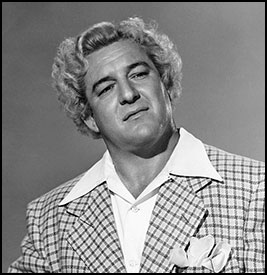 A truly influential and often imitated figure, George’s mannerisms inspired not only wrestlers like “Classy” Freddie Blassie, “Nature Boy” Buddy Rogers, “Adorable” Adrian Adonis, Goldust, “Exotic” Adrian Street and countless others, but he was also a huge influence on non-wrestling celebrities such as Muhammad Ali, Liberace and James Brown.
A truly influential and often imitated figure, George’s mannerisms inspired not only wrestlers like “Classy” Freddie Blassie, “Nature Boy” Buddy Rogers, “Adorable” Adrian Adonis, Goldust, “Exotic” Adrian Street and countless others, but he was also a huge influence on non-wrestling celebrities such as Muhammad Ali, Liberace and James Brown.
Gorgeous George is a member of the Stampede Wrestling Hall of Fame (1995), Wrestling Observer Newsletter Hall of Fame (1996), Professional Wrestling Hall of Fame (2002), and the WWE Hall of Fame (2010).
Following years of battling alcoholism, George “Gorgeous George” Wagner died of a heart attack on December 26, 1963 at the age of 48.
